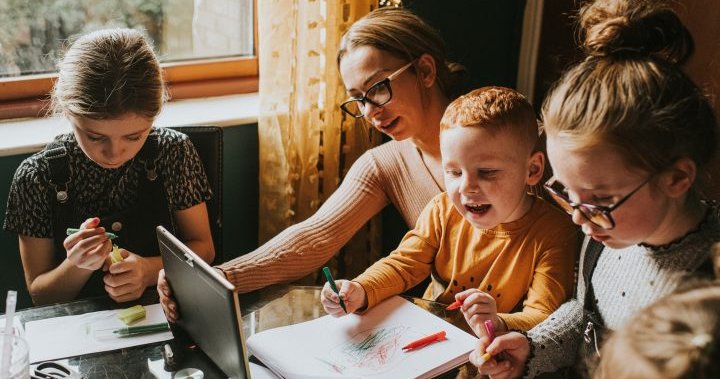Having a child is often seen as a blessing, but a new study has found many parents are reporting burnout and experts caution that can impact the whole family.
The study from the Ohio State University (OSU) College of Nursing surveyed 722 adults in the U.S. with children under the age of 18 last summer and found 57 per cent of parents self-reporting burnout.
The issue, study co-author Bernadette Melnyk says, is the expectations parents feel are placed on them.
“There is no such thing as a perfect parent,” she told Global News. “But so many parents strive for levels of perfection with their children in particular, and people in our study who believed they were not a good parent had more burnout, more depression, more anxiety and their children were doing more poorly.”
The responses the study received included parents saying they felt like there was an “internal drive to have the perfect day for my kids,” while another said despite the pressure to be a perfect parent, it was a goal that could never be reached.
That aim for perfection often was associated with both internal and external expectations, ranging from worrying if they are a good parent to perceived judgment from others, as well as wanting to have more time to play with their children.
Julie London with the Positive Parenting Association of Ontario said it often comes down to trying to keep up appearances to prevent judgment.
The latest health and medical news
emailed to you every Sunday.
“Ultimately, parents simply want the best for their children,” she said. “(But) when parents can ignore societal pressures they are doing themselves and their children a favour.”

Canadian parenting expert and family counsellor Alyson Schafer told Global News that judgment can lead to parents not reporting when they’re feeling burned out.
“We were always sort of told that you’re supposed to love being a parent, that a good parent is someone who’s on top of things and calm,” she said. “The reality is, parenting is incredibly difficult…. What we’re doing is we really end up saying, ‘I’m failing at the thing I’m supposed to be doing the best.’”
The study showed a decrease compared with a 2022 study by OSU where 66 per cent of parents reported being burned out during the pandemic. But like Melnyk, Schafer notes the numbers remain high and may not provide the full picture because of the hesitation to report.
“Admitting a weakness is extremely difficult as it is a very vulnerable thing and many of us are not good at being vulnerable,” London added in an email.
When parents feel that sense of failure, it can impact their parenting too. Melnyk says parents who may feel more depressed or anxious could parent more harshly.
In fact, the study found those who reported higher levels of burnout also had a greater likelihood to insult, criticize, scream at or even physically harm their child, such as through spanking.
Melnyk says parents should look to reduce levels of burnout by scaling back on commitments and trying to slow down. She recommends focusing on quality time as a family rather than stacking everyone’s schedule with activities simply because it seems like that’s what they should be doing.
According to the study, free play time in which the parent and child interacted together without the more structured elements of a hockey practice or music lesson led to more positive outcomes.
A higher number of structured extracurriculars was found to be associated with an increase in potential mental health disorders in kids, while the more time a parent would play with their child saw fewer such issues.
Schafer adds that lots of activities can lead to more stress because it means more money to pay, more running around and scheduling to do, and in turn, less time together as a family, which is often what their children want.
Both Melnyk and Schafer agree the best way to parent is through what’s called “positive parenting.”
“When parents combine love and warmth with their children, but with structure, gentle discipline, teaching their children consequences of the actions and decisions that they make,” Melnyk said.
© 2024 Global News, a division of Corus Entertainment Inc.





